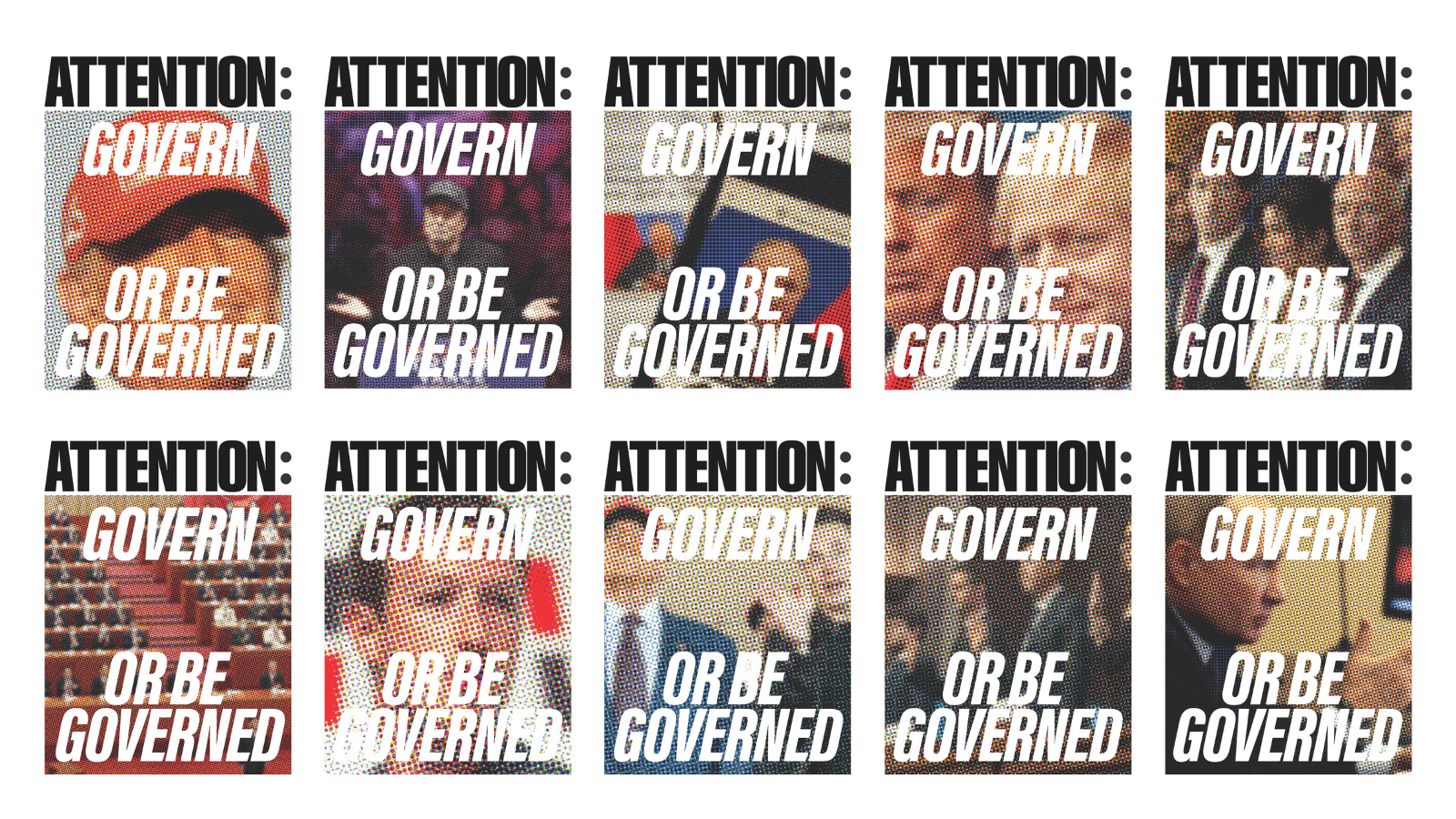Events
Check this space for upcoming events, or browse our past events below.

Securing Canada’s Digital Sovereignty: AI and the Growing Economy of Fraud
Join us for a critical conversation at a pivotal moment, wherein Canadian society is under growing pressure. Rising foreign interference, disinformation, and infrastructure vulnerabilities are a threat to Canada’s sovereignty. At the same time, Canada has struggled to respond. Critical bills—designed to strengthen election security, protect children online, update our privacy laws, and hold digital platforms accountable—failed to pass before Parliament was prorogued. At a moment of rising global risk, Canada remains exposed. But Canada’s new government has a chance to reset and define a new agenda.

Attention: Govern or Be Governed
The internet was initially sold to us as a force for connection – a borderless, democratizing set of technologies that would amplify voices, allow us to spread ideas, and strengthen civil society.
And, for a time, it did just that.
But, as platforms grew more powerful and we failed to constrain them, the tools we built to bring us together began to pull us apart. Social media companies designed systems to maximize attention – not safety. Disinformation campaigns outpaced journalism. Algorithms rewarded outrage over truth. What was once a new frontier of opportunity became a playground for exploitation, manipulation, and harm.
For the past decade, democracies have tried to respond. Policymakers, researchers, and civil society organizations around the world have fought to understand the problem, to build safeguards, and to regulate tech giants. Across the EU, UK, Australia, and Canada, policymakers began to construct digital governance architectures to balance innovation with accountability. But, just as they were getting close, the ground shifted beneath us. And now, global digital regulation – and a decade of progress we should be proud of – is under threat.
Two seismic shifts have changed the game. The first is the explosive rise of generative AI, which is reshaping not just what needs to be governed, but how we govern. The second? A newly radicalised United States that, in this post-election landscape, is no longer just a reluctant partner, but has become an active obstacle to regulation. An emboldened alliance between U.S. government actors and tech companies is now working to dismantle hard-own policy advances abroad, resisting any effort that doesn’t serve or prioritize the interests of its domestic tech sector.
For democracies around the world, the implications are stark: if we don’t act now, our information ecosystems – and the democratic values they support – could be lost to an unregulated tech oligopoly, and an American government that supports it. This is no longer just about platforms, it’s about sovereignty. It’s about whether democracies can still govern in the digital age – or whether they’ll be governed by it.
This October, we invite you to tackle these issues at Attention: Govern or Be Governed – a high-level international gathering of lawmakers, academics, civil society leaders, journalists, creatives, and technologists, who believe the world’s leading democracies can, and must, chart a new path forward.
To see the list of event speakers and agenda, visit the ATTENTION: website here.

Securing Canada’s Digital Sovereignty: A new agenda takes shape
Join us for a critical conversation at a pivotal moment, wherein Canadian society is under growing pressure. Rising foreign interference, disinformation, and infrastructure vulnerabilities are a threat to Canada’s sovereignty. At the same time, Canada has struggled to respond. Critical bills—designed to strengthen election security, protect children online, update our privacy laws, and hold digital platforms accountable—failed to pass before Parliament was prorogued. At a moment of rising global risk, Canada remains exposed. But Canada’s new government has a chance to reset and define a new agenda.
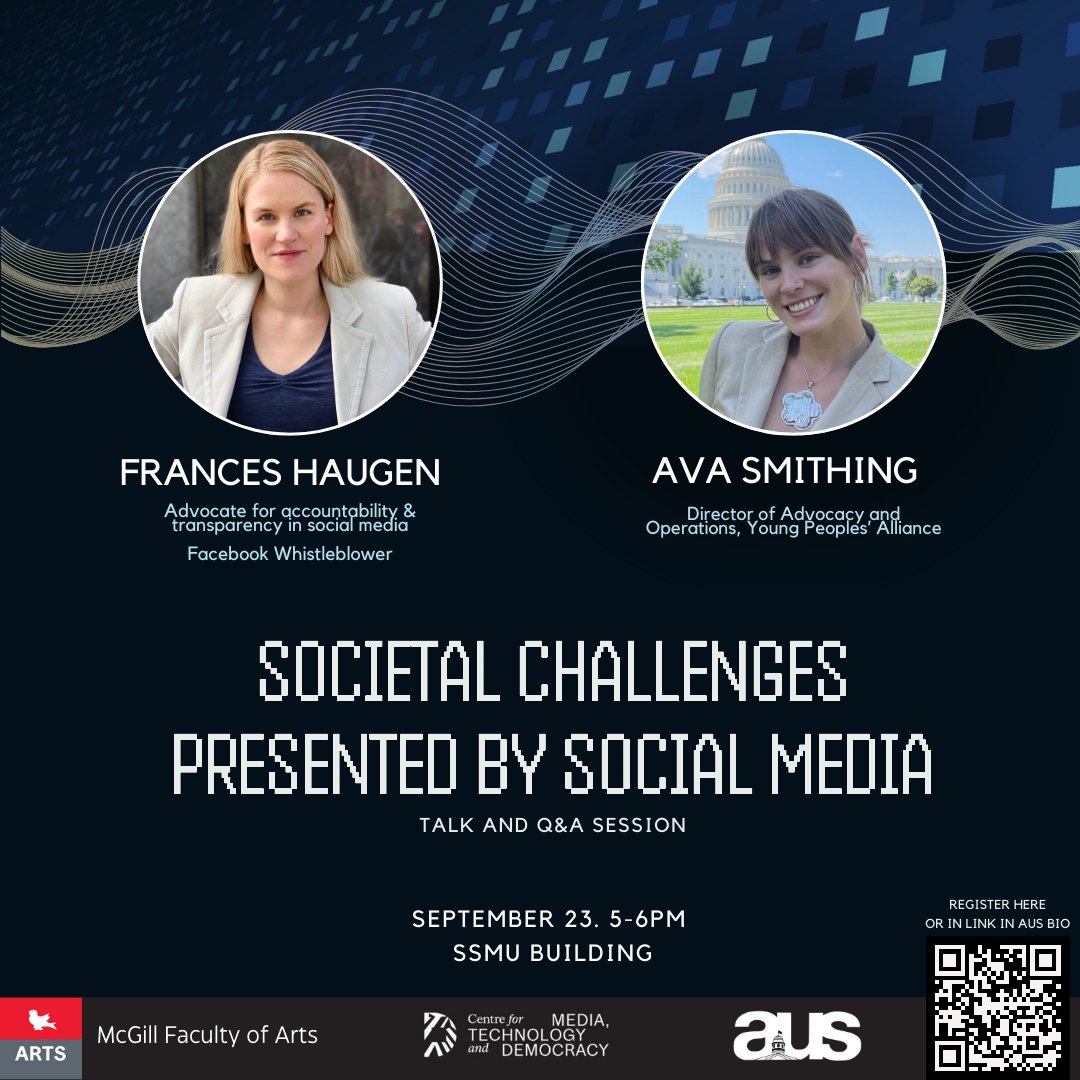
Societal Challenges Presented by Social Media
Join us for a conversation between Frances Haugen, former Facebook Whistleblower, and Ava Smithing, Director of Advocacy and Operations at the Young Peoples’ Alliance and Youth Fellow, Centre for Media, Technology and Democracy, on platforms, policy, and protecting young people online. In this lively discussion, Frances and Ava will chat about their roles in the global movement for digital rights and wellbeing, and their motivation to hold big tech companies to account.
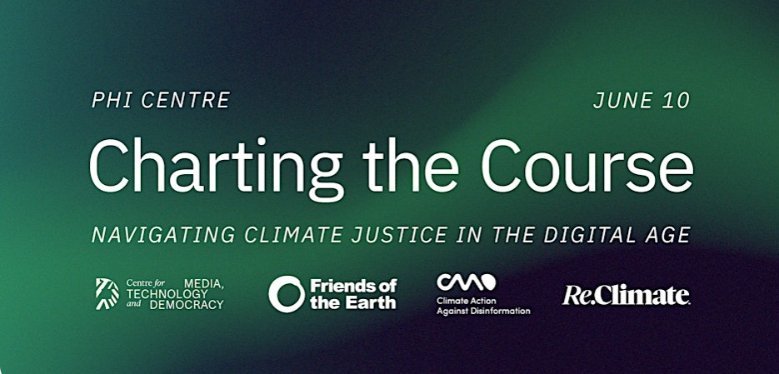
Charting the Course: Navigating Climate Justice in the Digital Age
How do we navigate the complex intersection of climate justice and digital technology? How are digital tools and infrastructures being used as both promising sites of collective environmental justice and scaling up extractivism? What promises does our media ecosystems offer in building climate justice and in what ways do they fuel misinformation?
Launching the Centre’s forthcoming Climate & Technology Essay Series, this event will include panels on:
Climate Misinformation and Journalism
Environmental Data Justice
Climate Justice Impacts of Tech and AI
Climate Justice and Technology Advocacy
Join us as experts from academia, advocacy, journalism, and policymaking dissect the intersection of climate justice and digital technology.
Agenda:
Welcome and Opening Address
Helen Hayes, Research Manager, Centre for Media, Technology and Democracy.
Panel 1: Climate Misinformation and Journalism - This panel will examine the question of climate misinformation, the role of digital media platforms, and journalism in engendering public debate and understanding.
Geoff Dembicki, Investigative Climate Reporter, DeSmog
Esli Chan, Ph.D. Candidate, McGill University
Chris Russill, Associate Professor, School of Journalism & Communication, Carleton University
Moderator: Sonja Solomun, Deputy Director, Centre for Media, Technology, and Democracy
Keynote: Climate Disinformation and the Role of Tech
Catherine McKenna, CEO of Climate and Nature Solutions, Former Minister of Environment and Climate Change of Canada, Chair of UN Secretary General’s Expert Group on Net Zero.
Panel 2: Environmental Data Justice - This panel will consider how data and knowledge practices are being mobilized by communities in building environmental justice and combating environmental racism. The authors bring experience in and beyond academia in environmental justice led-innovation practices, multi-cultural technologies, remote sensing, and conservation data justice.
Naolo Charles, Founder of the Black Environmental Initiative and Co-Founder of the Canadian Coalition for Environmental and Climate Justice
Joycelyn Longdon, Ph.D. Candidate and Founder, ClimateInColour
Ufuoma Ovienmhada, Ph.D. Candidate, Aeronautics and Astronautics Department, MIT
Moderator: Rachel Bergmann, Fellow for the Climate Justice, AI, and Technology Team, Centre for Media, Technology and Democracy.
Panel 3: Impacts of Tech and AI on Climate Justice - This panel will emphasize the climate justice impacts of digital technology, especially artificial intelligence.
Dr. Mél Hogan, Associate Professor, Film and Media, Queen’s University
Sanjana Paul, Co-founder and Executive Director, Earth Hacks
Camille Minns, Deputy Director, Earth Hacks and & Co-Founder, Environmental Justice in Technology (EJIT) Project
Melissa Gregg, Senior Industry Fellow, ARC Centre of Excellence for Automated Decision-Making and Society, RMIT University
Michael Khoo, Climate Disinformation Program Director, Friends of the Earth
Moderator: Janna Frenzel, PhD Candidate in Communication Studies, Concordia University
Book Talk: Petroturfing - Refining Canadian Oil Through Social Media - What role does social media play in rebranding Canada’s extractive industry as a social good? Jordan B Kinder will speak about his recently released book on the limitations of social media networks in promoting environmental justice.
Jordan B. Kinder, Assistant Professor, Communication Studies, Wilfrid Laurier University
Moderator: Hannah Tollefson, Ph.D. Candidate, McGill University, Project Lead, Centre for Media, Technology, and Democracy.

Bill C-63 Unpacked: Making the Internet Safer for Kids
Bill C-63 Unpacked: Making the Internet Safer for Kids will dive into how the proposed bill requires social media platforms to minimize users’ risk of exposure to seven kinds of online harms, to responsibly design products likely used by children, and to immediately takedown two types of content: intimate images shared without consent, and child sexual abuse material.
We will discuss how these provisions make the internet safer for kids and where it falls short. Our panel will unpack the proposed duty to protect children, its alignment with international best practices, and the extent to which the Bill’s takedown measures and content-specific mandates ensure that children are protected when they’re online.
This virtual roundtable will be moderated by Taylor Owen, Director of The Centre for Media, Technology and Democracy and Emily Laidlaw, Canada Research Chair in Cybersecurity Law and Associate Professor of Law at the University of Calgary.
They will be joined by panelists:
Samantha Reusch, Executive Director, Apathy is Boring - L'apathie c'est plate
Valerie Steeves, Professor of Criminology, University of Ottawa
Keith Baybayon, Chair of the Youth Advisory Council, Information and Privacy Commissioner of Ontario
Marie-Ève Nadeau, International Advocacy Manager, 5Rights
Lianna McDonald, Executive Director of the Canadian Centre for Child Protection, Inc.
Watch the recorded livestream on our YouTube channel.

Bill C-63 Unpacked: Criminal Code and Human Rights Act Hate Speech Amendments
Does Bill C-63 propose criminalizing thoughts? Life in prison for hate crimes? What is the value and risk of reintroducing hate speech to the remit of a human rights tribunal? What does hate speech even mean in law? “Those provisions” of the Online Harms Bill, which comprise approximately 10% of the bill, have generated most of the controversy. It is time to unpack them, dispel myths from reality, and identify crucial points of concern.
In this second roundtable of our series on the Bill, we will discuss Bill C-63’s proposed amendments to the Criminal Code and Canadian Human Rights Act. Our panel will unpack what the amendments mean in practice, the risks and benefits. With a wide range of opinions and perspectives, our conversation will reveal the nuances of ongoing debates around the Bill.
The roundtable will be hosted by Taylor Owen, Director of The Centre for Media, Technology and Democracy, and Emily Laidlaw, Canada Research Chair in Cybersecurity Law and Associate Professor of Law at the University of Calgary.
They will be joined by panelists:
Sandy Garossino, National Affairs Columnist, Canada’s National Observer
Kenneth Grad, Adjunct Professor & Ph.D. Candidate, Osgoode Hall Law School
Sunil Gurmukh, Assistant Professor and Assistant Dean, Faculty of Law, Western University
Richard Moon, Law Professor, University of Windsor
The virtual roundtable will take place on March 27th from 12 p.m.-1 p.m., and will be live-streamed to our YouTube channel.

Virtual Roundtable on the Online Harms Act: Featuring Members of the Expert Advisory Group on Online Safety to the Government of Canada
The Centre for Media, Technology and Democracy presented a virtual roundtable to discuss initial reactions to the Online Harms Act (Bill C-63) by five members of the Expert Advisory Group on Online Safety to the Government of Canada.
The panel was hosted by Taylor Owen, Director of The Centre for Media, Technology and Democracy, and Emily Laidlaw, Canada Research Chair in Cybersecurity Law and Associate Professor of Law at the University of Calgary.
The featured panellists:
Amarnath Amarasingam, Assistant Professor in the School of Religion and Department of Political Studies at Queen’s University. Expert in terrorism, radicalization and extremism, conspiracy theories, and online communities.
Heidi Tworek, Canada Research Chair, Associate Professor of International History and Public Policy at UBC, and director of the Centre for the Study of Democratic Institutions. Expert in history and policy around communications, especially on the effects of new media technologies on democracy.
Vivek Krishnamurthy, Associate Professor at the University of Colorado Law School and Director of the Samuelson-Glushko Technology Law & Policy Clinic. Expert in public policy and the intersection of human rights and technology.
This is the first in a series of conversations we will be having on the bill as the legislative process moves forward.
View the full recording of the event on our YouTube channel.
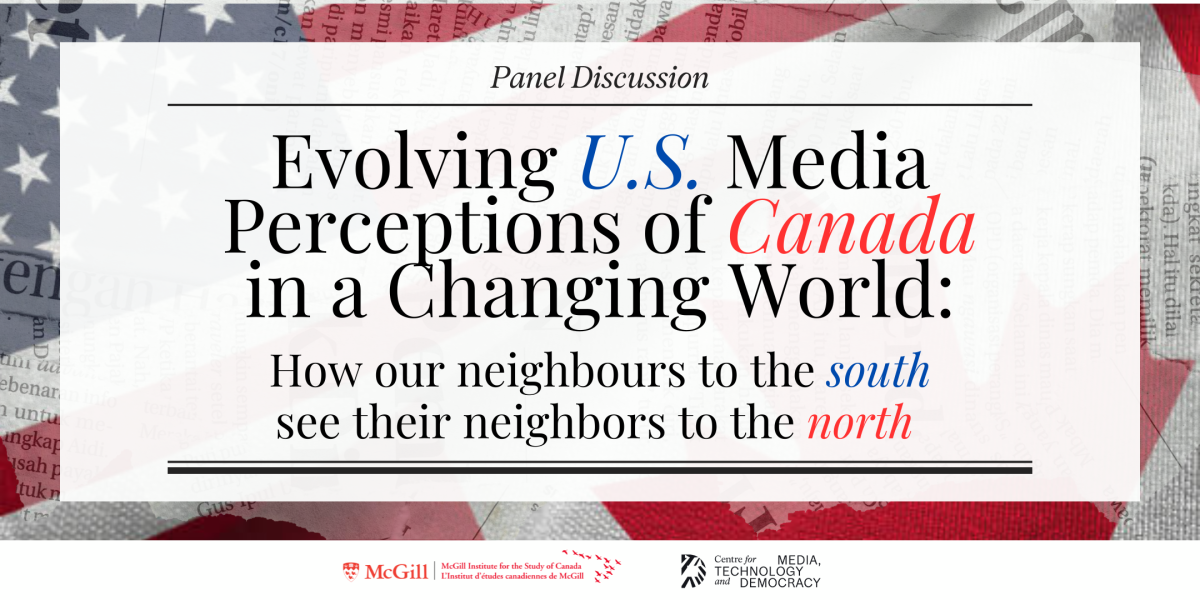
Evolving U.S. Media Perceptions of Canada in a Changing World: How our neighbours to the south see their neighbors to the north
A panel discussion among Canada-based journalists writing for U.S. media news outlets
This event is free, but registration is required. Register by clicking here.
Talking to a U.S. audience, the Prime Minister Pierre Trudeau once famously said: "Americans should never underestimate the constant pressure on Canada which the mere presence of the United States has produced. We're different people from you and we're different people because of you.”
While Canadians spend a lot of time thinking about the United States, most Americans seldom think about Canada, especially if they don't live in a border state. In this context, how do Canadian-based journalists working for U.S. media outlets pitch and tell stories about Canada for their readership in the U.S. and beyond? How do U.S. media outlets perceive Canada, and how has this perception changed over time? Has the image of Canada in the U.S. changed and, relatedly, how has the job of reporting about Canada for a U.S. and broader international audience evolved?
Join us for a panel discussion among Canadian journalists working for prominent U.S. media news outlets about their work and changing U.S. perceptions of Canada within and beyond the mass media.
Featuring:
Dan Bilefsky
Amanda Coletta
Emma Jacobs
Moderated by David Shribman
The lecture will be followed by a Q&A and reception. This event is co-organized by the McGill Institute for the Study of Canada and the Centre for Media, Technology and Democracy at the Max Bell School of Public Policy.
Bios:
Dan Bilefsky spent nearly 20 years as an international correspondent for The New York Times in Paris, London, New York, Brussels, Istanbul, Prague and Montreal. He was previously a reporter for The Wall Street Journal and FT and is author of the true crime thriller, The Last Job, which he’s adapting for a podcast.
Amanda Coletta is a Toronto-based correspondent who covers Canada and the Caribbean for The Washington Post. She previously worked in London (UK), first at the Economist and then the Wall Street Journal. Coletta began her career as a freelance journalist covering the business and governance of sport for publications including Foreign Policy, The New York Times, The Globe and Mail and the Canadian Broadcasting Corp.
Emma Jacobs is a Montreal-based freelance journalist who has worked in radio and podcasts for over a decade. She has covered Canada for NPR since 2019 and produced podcasts for organizations ranging from National Geographic to the Smithsonian Museum of American Art. Previously, she worked for NPR member-stations WHYY and WNYC.
David Shribman, executive editor of the Post-Gazette from 2003 to 2019, writes a nationally syndicated column in the United States; prepares a separate column on Americans affairs for The Globe and Mail; is scholar-in-residence at Carnegie Mellon University; and teaches American politics at the Max Bell School of Public Policy at McGill University. Shribman was awarded the Pulitzer Prize in 1995 for his writing on Washington and the American political scene. He led the coverage of the Tree of Life synagogue massacre that won the Pulitzer Prize a quarter-century later.
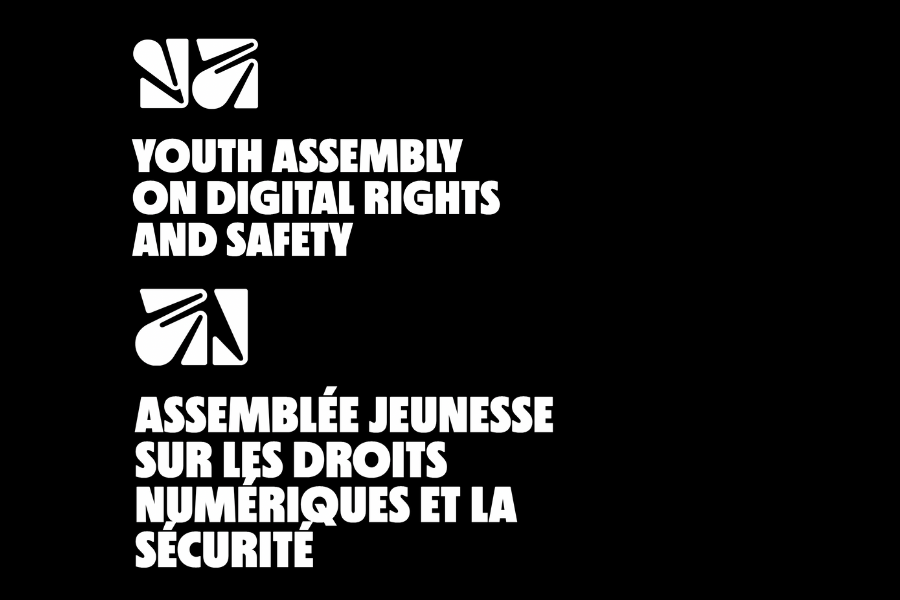
Youth Assembly on Digital Rights and Safety
We're gathering a diverse group of 39 Canadian 18-year-olds to talk about how you understand, interact with, and hope to change online platforms. We want to hear your thoughts on how emerging digital rights can help promote your well-being, safety, and success online. You'll have the chance to speak with academic experts and policymakers and share your own experiences of the digital world.
Register at http://digitalassembly.ca/
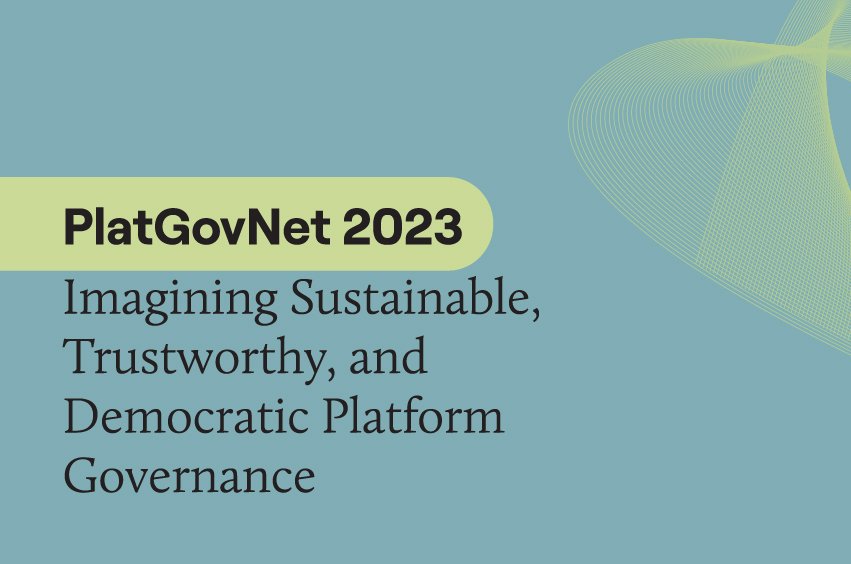
The Platform Governance Research Network Conference 2023: Imagining Sustainable, Trustworthy, and Democratic Platform Governance
PlatGovNet2023: Imagining Sustainable, Trustworthy, and Democratic Platform Governance
The two main research days of the conference will happen virtually on April 3rd and April 4th, with sessions running between 1100-1700 UTC on each day. Confirmed sessions include panels on a wide range of topics, ranging from the regulation of labour platforms to content moderation in the global context.
Registration is free and available here. Confirmed registrants will have access to session recordings, so please register and spread the word widely with interested colleagues, collaborators, and students.

Digital Policy Rounds: Mis/disinformation and the question of authenticity
Join us for our next #DigitalPolicyRounds event

Élection québécoise de 2022: Information et politique dans l’après-COVID et l’après-Trump
Entre méfiance, désinformation et cohésion sociale, cette table ronde discute des conséquences de la pandémie et du trumpisme sur le paysage politique et médiatique québécois. Un panel d’experts des milieux académique et du secteur public présenteront leurs observations en lien avec l’élection provinciale québécoise de 2022.
Cette table ronde est organisée par le Centre pour les médias, la technologie et la démocratie (MTD), la Chaire UNESCO en prévention de la radicalisation et de l’extrémisme violents (UNESCO-PREV), le Centre d’études sur les médias (CEM) et le Centre pour l’étude de la citoyenneté démocratique (CÉCD).
From distrust to disinformation and social cohesion, this roundtable discusses the consequences of the pandemic and Trumpism on the political and media landscape in Quebec. Hear from an expert roundtable of academics and public officials about their observations in relation to the 2022 Quebec provincial election.
This roundtable is organized by the Centre for Media, Technology, and Democracy (MTD), the UNESCO Chair in Prevention of Radicalisation and Violent Extremism (UNESCO-PREV), the Centre d’études sur les médias (CEM), and the Centre for the Study of Democratic Citizenship (CSDC).
À propos des panélistes / About the Speakers
Mathieu Lavigne est le Directeur du Projet sur la désinformation électorale au Québec et chercheur affilié au Centre pour les médias, la technologie et la démocratie et au Centre pour l’étude de la citoyenneté démocratique. Il se spécialise dans l’étude de la communication et des comportements politiques, avec un intérêt particulier pour la désinformation, la confiance dans les élections, la polarisation politique et la santé de l’écosystème d’information. Ses recherches ont été publiées dans Party Politics, le Harvard Kennedy School Misinformation Review et l’Elgar Encyclopedia of Technology and Politics.
Sylvain Bédard est détenteur d’une formation multidisciplinaire et d’une expérience pratique en communication et en stratégie politique, Sylvain Bédard agit comme coordonnateur scientifique à la Chaire UNESCO-PREV. Il travaille principalement sur les questions liées au conspirationnisme, à la désinformation et à la résilience démocratique.
Éric Bélanger est professeur titulaire au département de science politique de l’Université McGill. Il est aussi membre du Collège de nouveaux chercheurs et créateurs en art et en science de la Société royale du Canada ainsi que du Centre pour l’étude de la citoyenneté démocratique. Ses recherches portent sur la politique canadienne et québécoise, les partis politiques, l’opinion publique et les comportements électoraux. Il a publié plus de 70 articles sur ces sujets dans plusieurs revues scientifiques, notamment Comparative Political Studies, Political Research Quarterly, Electoral Studies, Publius: The Journal of Federalism, le European Journal of Political Research, West European Politics, Political Communication, Nations and Nationalism et la Revue canadienne de science politique. Il a également coécrit 9 livres, dont Le comportement électoral des Québécois (2009) et Le nouvel électeur québécois (2022), et codirigé 3 ouvrages collectifs, dont Les Québécois aux urnes (2013) et Voting in Quebec Municipal Elections: A Tale of Two Cities (2022).
Kathia Légaré mène des recherches et des analyses sur la désinformation et la mésinformation en contexte électoral chez Élections Québec. Elle est responsable de la coordination des actions de l’institution en la matière. Elle a obtenu un doctorat en science politique de l’Université Laval.
Colette Brin est professeure titulaire au Département d’information et de communication de l’Université Laval et directrice du Centre d’études sur les médias. Sa recherche et son enseignement s’articulent autour des transformations actuelles du journalisme, notamment par l’entremise des politiques publiques et des initiatives organisationnelles, et des pratiques informationnelles des citoyens. Elle coordonne l’édition canadienne du Digital News Report (Reuters Institute for the Study of Journalism) et a codirigé l’ouvrage Journalism in Crisis : Bridging Theory and Practice for Democratic Media Strategies in Canada (University of Toronto Press, 2016). Elle préside le Comité consultatif indépendant pour l’admissibilité aux mesures fiscales pour soutenir le journalisme de l’Agence du Revenu du Canada. Enfin, Mme Brin siège au Comité scientifique de l’Observatoire international sur les impacts sociétaux de l’intelligence artificielle et du numérique.
Marie-Eve Carignan, Ph.D., est professeure agrégée au département de communication de l’Université de Sherbrooke, co-titulaire et directrice du Pôle médias de la Chaire UNESCO en prévention de la radicalisation et de l’extrémisme violents (Chaire UNESCO-PREV). Elle est professeure chercheure au sein du groupe de recherche en communication politique (GRCP), chercheure régulière au Centre de recherche Société, Droit et Religions de l’Université de Sherbrooke (SoDRUS) et chercheure associée au Centre de recherche sur la régulation et le droit de la gouvernance (CrDG) ainsi qu’au Centre de recherche sur l’enseignement et l’apprentissage des sciences (CREAS). Professeure Carignan concentre principalement ses recherches sur l’analyse de contenus médiatiques, l’impact des médias en société, la désinformation, la communication de risques et de crise ainsi que les stratégies de communication. Elle a collaboré à plusieurs ouvrages collectifs et publié dans des revues nationales et internationales en communication, en santé, en journalisme, en politique et en histoire. Marie-Eve Carignan est co-autrice des livres « La Maison-Blanche vue du Québec : La couverture des élections américaines par les médias québécois », paru aux Éditions La Presse en 2021, et « Mon frère est complotiste : rétablir le lien et le dialogue social », publié aux Éditions de l’Homme en novembre 2022. Impliquée dans des initiatives scientifiques d’envergure, elle est notamment membre du Comité de rédaction des Cahiers du journalisme et siège au Comité directeur du projet La Science d’abord ainsi qu’au Comité National de Rapprochement, Arts, Culture et Santé.
David Morin est professeur titulaire à l’École de politique appliquée de la Faculté des lettres et sciences humaines de l’Université de Sherbrooke. Ses champs d’expertise et son expérience professionnelle portent sur les questions de sécurité nationale et internationale, en particulier sur l’extrémisme violent, la radicalisation, la désinformation et le conspirationnisme. Il est cotitulaire de la Chaire UNESCO en prévention de la radicalisation et de l’extrémisme violents (Chaire UNESCO-PREV). Il a siégé sur le groupe consultatif d’experts sur la sécurité en ligne chargé de fournir des conseils au gouvernement du Canada sur un cadre législatif et réglementaire permettant de lutter au mieux contre le contenu préjudiciable en ligne. Il siège également, à titre d’expert désigné, sur le comité de pilotage du Réseau francophone de prévention de la radicalisation et de l’extrémisme violents pouvant conduire au terrorisme (FrancoPREV) appuyé par l’Organisation internationale de la Francophonie. Enfin, outre de nombreuses activités scientifiques et auprès des milieux de pratique, le professeur Morin contribue activement au débat public et dans les médias sur ces questions.

Digital Policy Rounds: Technology-Facilitated Gender-Based Violence
Join us for our next #DigitalPolicyRounds event

Digital Policy Rounds: Health Communications
Join us for our next#DigitalPolicyRounds event

Digital Policy Rounds: Climate Justice, Tech & Media
Join us for our second #DigitalPolicyRounds event
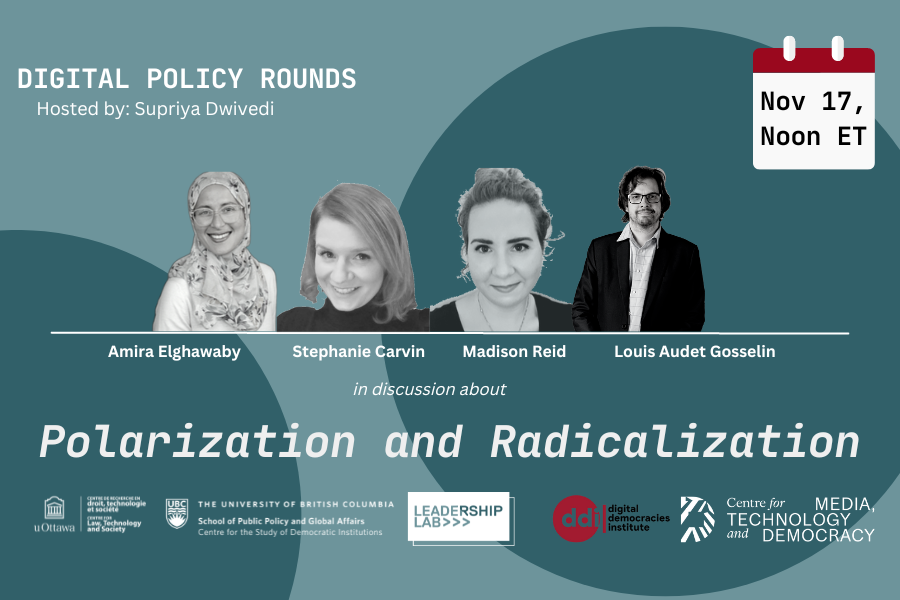
Digital Policy Rounds: Polarization & Radicalization
Hate crimes in Canada are on the rise, as are concerns that the country is polarizing. The pandemic has revealed both new and longstanding global movements of radicalization and violent extremism, often enabled by our digital ecosystem. How concerned should we be here in Canada? And what can be done?

Call for Abstracts
The Platform Governance Research Network call for abstracts is open. Deadline to submit is December 18 at midnight.

2022 Annual Beaverbrook Lecture (livestreamed and in person)
The 2022 Beaverbrook Annual Lecture, featuring Frances Haugen (Facebook whistleblower and advocate for accountability & transparency in social media) and Jameel Jaffer (Director of the Knight First Amendment Institute, Columbia University), will consider the US Supreme Court cases involving Florida and Texas’s social media laws while addressing broader questions surrounding free speech and social media regulation.

Global Governance of Online Harms: Conference
Global coordination and potentially new international regimes for online regulation are needed. No single government can effectively protect democratic values from the triple impact of the transnational flow of information, the asymmetric power of tech companies, and the illiberal behavior of particular governments. The goal of this multi-event conference is to address this global governance challenge head-on.
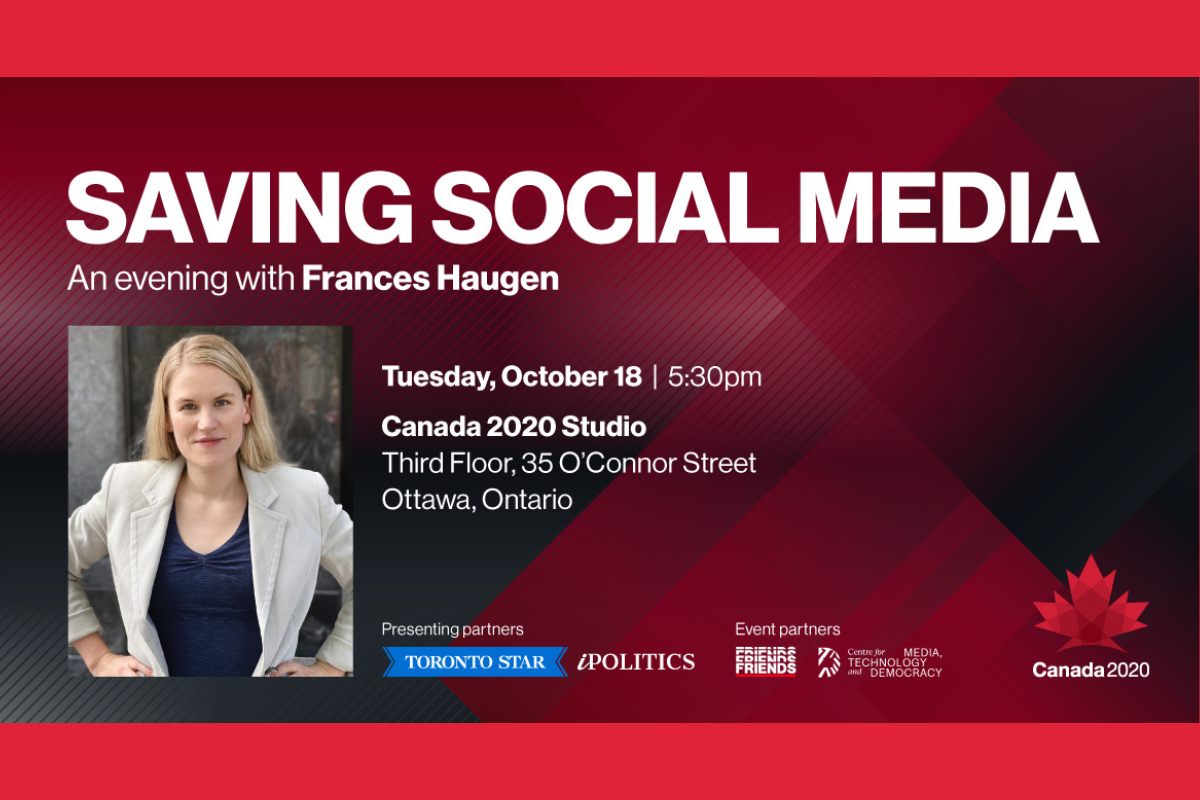
Saving Social Media: An Evening with Frances Haugen
A reception and featured conversation between Frances Haugen and the Centre’s Director of Policy and Engagement, Supriya Dwivedi, on how we can strengthen the information environment for a healthier democracy, and build social media that brings out the best in humanity.

NEW DATE: Roundtable on Children’s Rights & Safety Online
Although recent progress has been made with the naming of children in Bill C-27, there are a series of additional concerns related to digital privacy, including the use of facial recognition and other artificial intelligence technologies, impacting the potential harm that children can face in their online activity.

Roundtable on the Artificial Intelligence and Data Act
As part of its newly re-introduced overhaul of privacy legislation, the federal government has included a completely novel regime to regulate AI through the Artificial Intelligence and Data Act (AIDA). An incredible virtual panel of experts sifted through the Act and provided their initial analysis and reactions.

Roundtable on the Online News Act (Bill C-18)
Following the model of Australia’s News Media Bargaining Code, the Government of Canada has just announced the Online News Act (Bill C-18), which compels digital platforms to engage with outlets and pay for news. Hear experts’ takes on the tabled legislation in this roundtable discussion.
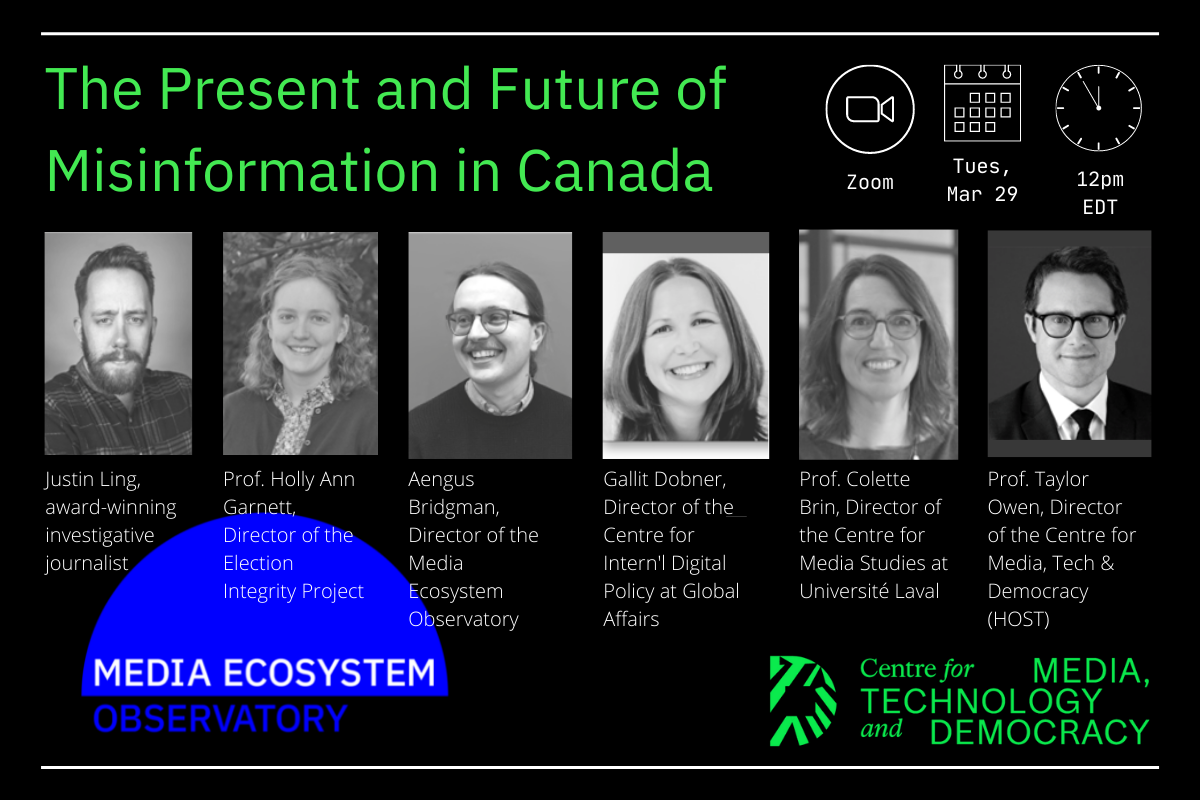
The Present and Future of Misinformation in Canada
The Media Ecosystem Observatory convened an expert roundtable of journalists, academics, and other defenders against misinformation to discuss what they have learned, how it threatens democracy, and how we can combat it.

“Discriminating Data” Book Discussion with Wendy Hui Kyong Chun
Research Director Sonja Solomun chatted with Wendy Hui Kyong Chun about her newly published book, “Discriminating Data: Correlation, Neighborhoods, and the New Politics of Recognition” (MIT Press).

National Approaches to Online Harms Regulations
The Centre for Media, Technology and Democracy, the Ada Lovelace Institute, and the Centre for International Governance Innovation (CIGI) hosted a discussion of the challenges and opportunities raised by legislation aimed at addressing “online harms” and how regulators charged with enforcing these powers might consider proceeding.

Our Social Dilemma: Confronting Online Harms in Canada
This event introduced the Cybersecure Policy Exchange’s new report, Rebuilding Canada’s Public Square, and responded to the Government of Canada’s recent proposal for new legislation to address illegal online content, presenting the results of a new survey of 2,500 Canadians’ perspectives of social media.

Online Disinformation Risks: Issues for Canadian News Media and Advertisers
The Centre for Media, Technology & Democracy has been working alongside the Digital Democracies Institute (Simon Fraser University) and the Centre d’études sur les médias (Laval University), analyzing the role of funding in the dissemination of mis/disinformation online across different news websites in Canada. This panel discussion outlined their final report’s findings.

Media Capture: How Money, Digital Platforms & Governments Control the News
The Centre for Media, Technology, and Democracy at McGill University and Columbia University's School of International and Public Affairs (Technology, Media, and Communications Specialization) launched Anya Schiffrin's book, "Media Capture: How Money, Digital Platforms, and Governments Control the Media."

